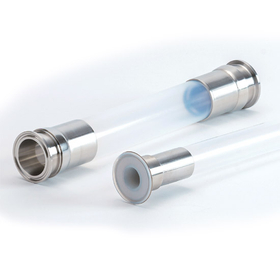I will explain the differences between fluororesin and Teflon.
The difference between fluoropolymer and Teflon is the difference between a general name and a trademark. Fluoropolymers include various types such as PTFE, FEP, PFA, and ETFE. Teflon is a trademark of Chemours and is a brand name for some fluoropolymers. Therefore, even if they are referred to differently, such as fluoropolymer coating or Teflon processing, they may refer to the same coating. PTFE was discovered in 1938 by Dr. Plunkett of DuPont in the United States and was later marketed as Teflon PTFE. It later became famous for Teflon coating on frying pans, and the name Teflon became widely known. Currently, the Teflon trademark can only be used in factories that have entered into a licensing agreement with Chemours. Yoshida SKT entered into a contract with DuPont in January 1968 as a Licensed Industrial Applicator.
Inquire About This Product
Related Videos
basic information
**Properties of Teflon Resin and Fluororesin** ■ Non-stickiness It has excellent release properties even against strongly adhesive substances, meaning it does not stick or is difficult to stick. ■ Water and Oil Repellency It repels water and oil well when they come into contact with the surface. Therefore, it is less likely to get dirty and can be easily cleaned. ■ Heat and Cold Resistance Among resins, it has high heat resistance, enduring high temperatures (up to 260°C). It also withstands low temperatures down to -260°C. ■ Low Friction It has a slippery surface with a low friction coefficient. Additionally, it exhibits excellent lubricity. ■ Chemical Resistance It is rarely affected or corroded by chemical substances such as acids and alkalis. In the case of coatings, if the film is thin, it remains intact, but chemicals and solutions can penetrate the film and corrode the substrate, so a thicker film is applied to prevent substrate corrosion. ■ Electrical Properties It has high dielectric strength (the strength against dielectric breakdown), volume resistivity, and surface resistivity, making it excellent in electrical insulation.
Price range
Delivery Time
Applications/Examples of results
Please feel free to contact us.
Company information
To maximize the performance of manufacturing equipment and machine parts, Yoshida SKT derives the "optimal solution" tailored to our customers from hundreds of surface treatment technologies. - Decreased productivity due to adhesive troubles - Instability in product quality due to friction - Early deterioration of equipment due to corrosion We respond to these challenges in the manufacturing field with our extensive track record and reliable technical expertise. In 1963, we began fluoropolymer processing. In 1968, we signed a licensing agreement with DuPont (now Chemours), supporting manufacturing innovations for over 2,000 customers across various industries, from automotive to medical and aerospace. Furthermore, in 2024, we are focusing on the development of next-generation products, such as PFAS-free coatings, contributing to the advancement of sustainable manufacturing. With a three-base system in Nagoya, Tokyo, and Yamaguchi, we flexibly respond to both mass production and custom orders. Our consistent quality management system ensures that we deliver reliable quality. For solving challenges in the manufacturing field, trust the surface treatment experts at Yoshida SKT.










![[Semiconductor/Class 100 Compatible] 100% Water-Free Air Nozzle](https://image.mono.ipros.com/public/product/image/2116982/IPROS15202438644694791694.png?w=280&h=280)
